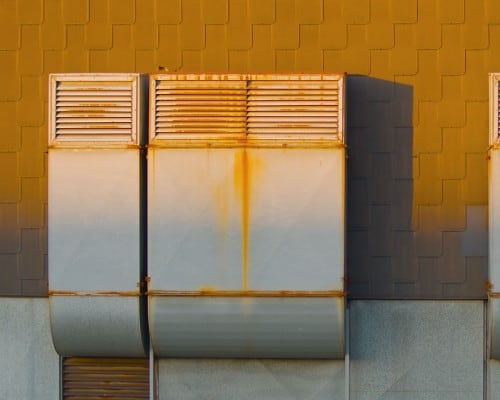As homeowners, we often look after the visible aspects of our house—chipped paint, collected dust, and fingerprinted windows—but what about the things that are out of sight? In the heart of your home lies a vital system, your heating and cooling system, which often goes unnoticed until it breaks down. This unsung hero tirelessly works to provide us with comfort, regardless of the season.
Believe it or not, just like other components in your home, your ducts have a lifespan and eventually wear out. But how do you know when it’s time to replace your HVAC ductwork? This post will look at some of the signs your air ducts are getting old.
River Valley Air Conditioning, Inc. is here to give you our advice on how to keep your home and its systems working at peak efficiency.
Understanding the role of your HVAC ductwork
Your HVAC ductwork plays an integral part in creating a healthy and comfortable home environment. If you plan to replace your ductwork, it is crucial to know its significance. Here’s how it contributes to home comfort:
- Regulation of temperature: Your HVAC ductwork is responsible for disbursing both hot and cool air throughout your home, helping maintain consistent temperatures year-round.
- Improvement of air quality: Clean and maintained ductwork helps filter out dust, allergens and airborne contaminants to provide improved indoor air quality in your home. This can especially benefit those living with allergies or respiratory conditions.
- Humidity control: An efficient ductwork is key in keeping humidity at an acceptable level in your home. Effective air management helps avoid mold and mildew growth that thrive in humid environments by maintaining adequate air circulation.
- Energy efficiency: An efficient ductwork system reduces the energy your HVAC system uses to heat or cool your home, reducing utility bills and saving energy.
- Noise reduction: Good quality, well-installed ductwork can significantly reduce noise levels resulting from the HVAC system operation, contributing to a more peaceful home environment.
The ductwork or the “lungs” of your home do a lot more than just move air back and forth. Ducts help keep your home safe, comfortable, and healthy.
When to replace ductwork – The telltale signs
Below, we’ve outlined several key signs that your HVAC ductwork may need to be replaced. Paying close attention to these signs can help ensure your system continues operating efficiently and keeps your home comfortable throughout the year.
Unusual noises
If you start to hear rattling, buzzing, or whistling noises emanating from your ductwork, this could be a sign of deterioration. Aging ducts can develop holes or become disjointed, causing these unusual sounds.
Be attentive to any new or increasing noises; they might be telling you it’s time for a checkup.
High energy bills
Observe your energy bills closely.
An unexpected or consistent increase in your energy costs could indicate that your HVAC system is working harder due to inefficient ductwork. Leaky or poorly insulated ducts could be the culprit causing your HVAC system to overcompensate and raise your energy usage.
Uneven heating or cooling
Are some rooms in your home too hot and others too cold, regardless of how you adjust your thermostat? Uneven heating or cooling often indicates damaged ductwork. So, if your ducts don’t distribute air properly, it’s time to replace your ductwork.
Poor air quality and health symptoms
If you begin to notice an increase in dust in your home, or a decline in the air quality, this could be due to dirty or leaky ductwork. Furthermore, your ductwork could also be the culprit if new or worsening allergy symptoms have surfaced within your family.
Aging system
Finally, consider the age of your HVAC system. It might be time to replace your HVAC ductwork if it’s over 15 years old, even with no visible symptoms. With age comes decreased effectiveness, leading to reduced comfort and efficiency.
Remember, at River Valley Air Conditioning, Inc., we are always here to help. If you’re experiencing any of these signs, contact us. We will inspect your current system and provide a professional assessment.
The lifespan of your HVAC ductwork
Your HVAC ductwork won’t last forever. The resilience of your HVAC ductwork relies on a variety of factors, such as:
- Installation quality
- Material type
- Level of maintenance required
- Environmental conditions
With the right care, ducts should provide efficient heating and cooling for 15 to 20 years. This, however, is an approximation. To keep your unit in working order, watch out for issues and have professionals like River Valley Air Conditioning Inc. inspect your unit.
Our tips for HVAC and duct maintenance
To reduce the chance of having to prematurely replace your AC ductwork, here are a few expert maintenance tips:
- Regular cleaning: Dust, pollen and other allergens can build up in your ductwork system. A professional cleaning it out every few years will keep it in optimal condition.
- Sealing and insulation: Inspect your ductwork for any leaks or gaps. If you spot any leaks, seal them with mastic sealant or metal tape to improve your system’s efficiency. Additionally, insulating your ductwork in unconditioned spaces can prevent energy loss and improve comfort.
- Regular maintenance checks: Regular checkups and inspections of your HVAC system can help spot and rectify potential issues early – saving you from costly replacements and repair appointments.
- Changing air filters: Changing or cleaning your air filters can significantly improve your system’s performance. Dirty filters force your HVAC system to work harder – increasing energy usage and potentially damaging your system.
- Balancing dampers: Balancing dampers control the airflow to each part of your home. Adjusting dampers may help out uneven heating or cooling conditions in your home by disseminating air more evenly throughout.
- Install a carbon monoxide detector: Many home systems burn fuel (oil and natural gas) to produce heat. Malfunctioning equipment or leaky ducts pose the risk of incomplete combustion (when fuels don’t burn completely) potentially letting carbon monoxide (CO) gas enter your home. Install a CO detector to safeguard your home from toxic gasses.
Need to replace HVAC ductwork? Call River Valley!
If you’re experiencing issues with your HVAC ductwork or think a replacement might be in order, contact us. With over 50 years of experience in serving our community, River Valley is a seasoned professional offering top-quality HVAC services at a reasonable price.
Our professionals are trained to help you with any of your heating and cooling needs. Your health and comfort are important to us. Contact us now to schedule a consultation.

